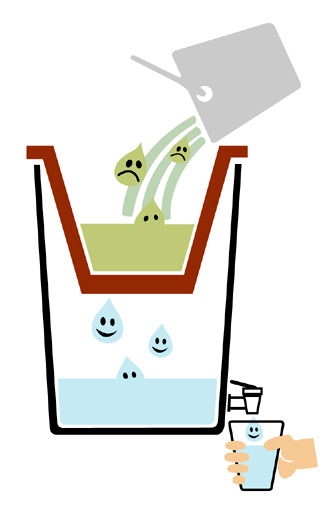Filtron, ceramic filter for drinking water
Presentation
FILTRÓN is a low cost household filter which treats contaminated water in order to render it safe to drink. FILTRÓN basically consists of a filtering element that can be made by local potters using local materials, with no need for electricity or advanced technology.
The Millennium Summit goal for 2015 to “halve the proportion of people without sustainable access to safe drinking water” is impossible to achieve by conventional methods, because costs would be too high. FILTRÓN is an innovatory system that can help attain this objective by ensuring low cost drinking water to poor families. Furthermore, it uses a technology that can be applied by members of the family and which generates job opportunities for local artisans.
FILTRÓN is not just a filter. In terms of health, it provides safe drinking water, removing turbidity and eliminating bacteria, which cannot pass through its tiny pores. The filter is impregnated with colloidal silver, which produces a reaction that makes any harmful agents passing through the filter completely harmless for human beings. Since FILTRÓN is made of clay, which is the basis of all known cultures, it is culturally acceptable to communities. Socially, the consumption of clean drinking water reduces illnesses, protects the household economy and guarantees a motivated workforce for the production of FILTRÓN, thus generating local employment. As far as technology is concerned, FILTRÓN can be made by local craftsmen using local materials; only a brief period of training is required. Mass production, too, involves a minimal amount of equipment. In economic terms, it guarantees drinking water for a Nicaraguan family at a cost of US$10 per filter.
FILTRÓN is based on pre-Columbian American practices, which included working a clay pot from which they extracted uncontaminated water by tilting the container on its side; now a faucet is used instead. In 1980, Fernando Mazariego improved this system by introducing an application of colloidal silver. In 1998, Potters for Peace, an international NGO that trains potters from developing countries, made further progress by developing a large-scale production process, which substantially reduced costs from US$20 to US$10 per filter. An important part in all this was played by Ron Rivera, a sociologist and potter, who had a leading role in the process of improving and disseminating the technology at the international level.
FILTRÓN has received national and international recognition. Among the most important at the international level are the World Bank’s “Marketplace 2004” Prize in Cambodia, awarded for the transfer of the technology from Nicaragua, and a prize awarded by the Association of Latin-American Health Engineers in1982.
Potters for Peace decided not to patent the technology, but to publish information on the INTERNET and make it public domain.
DOWNLOAD THE BROCHURE PDF
Spanish (0.5 MB)English (0.5 MB)








 COUNTRY OF ORIGIN
COUNTRY OF ORIGIN